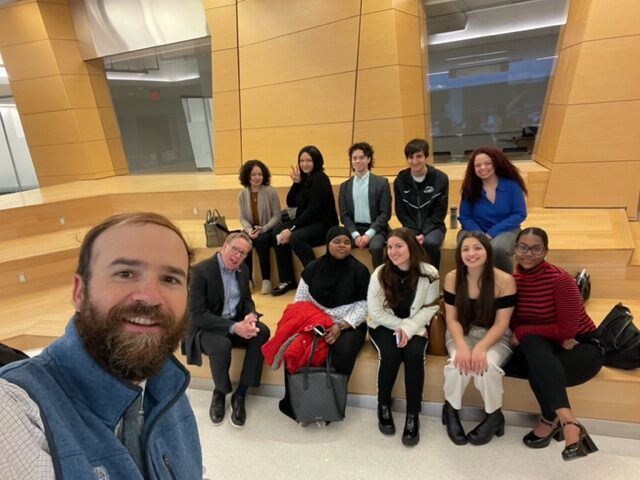The academic programs at SCS benefit from the inclusion of a wide range of students who bring with them invaluable personal and professional experience into the classroom experience. As a School at Georgetown committed to a “world-class, values-based education to a diverse array of communities and individuals throughout their academic and professional careers,” SCS attracts students from across the lifecycle of professional experience and industry knowledge who share in a common desire for lifelong learning. In this edition of Mission in Motion, we sit down with Vincent Reppert, a student in the Master of Professional Studies in Real Estate (MPRE) program. Vincent reflects on his career in professional athletics, his decision to apply to Georgetown after years serving as a litigator, and how his faith and the Spirit of Georgetown motivate his passion for learning about real estate.
- Tell us a little bit about yourself. What led you to apply to the Master of Professional Studies in Real Estate?
I am a practicing real estate attorney and have been for over 20 years. For much of this time I have served as a litigator, engaged in many real estate issues related to affordable housing, banking, predatory lending, and criminal activities committed by government officials. Litigation is extremely stressful and it can be detrimental to maintaining a healthy lifestyle. So after many years of litigation practice, I discerned that I needed to pursue professional practices that were healthier and more personally meaningful. As a result, I transitioned into more of a practice representing individuals and investors concerning the development of properties and the acquisition of properties. The decision to change my practice focus was based on lessons I’ve learned in athletics (I played Division I college and professional football) and in my life of faith (I’m a committed Catholic). In this discernment process, I realized that I wanted to use my God-given talents to become a more generous person who helps people with my knowledge and skills. Also, as an owner of real estate, I have become interested in understanding the principles and practices of real estate so that I can share my knowledge with others.
- One of the hallmarks of Ignatian Pedagogy, the style of teaching and learning inspired by the Jesuit education tradition, is regular reflection about our lived experiences. How has your career in law informed what you bring to the classroom and your learning experience in the real estate program?
My athletic experience enabled me to develop a very strong work ethic and allowed me to be aggressive when I needed to be, but also supportive, especially when others are hurting. I have attended Catholic universities like Seton Hall University School of Law. There, I was particularly impacted by a course in Canon Law taught by a priest who practiced in the Vatican. Through this connection, I was able to attend Canon Law disputes in Rome. This experience gave me a new light on how I viewed not only my profession but my life in general. I realized that I needed to do something more meaningful than assist wealthy people become even wealthier. While I have no regrets about my legal career, I believe that God has invited me to give back to others in a more meaningful way. I am grateful that the MPRE Program has allowed me to do this in the classroom. The program and the diverse student and faculty perspectives included in the community have expanded my views about real estate. I find this component of the MPRE Program invaluable and I believe that my classmates feel the same way.
- People for Others is one of the core values of the Spirit of Georgetown. How is your Georgetown education inspiring you to practice real estate in ways that serve the common good?
My Georgetown education, especially my interaction with my MPRE Program colleagues, has allowed me to offer examples from my own career of how to serve others, which is core to a Jesuit education. For example, I have shared with classmates from my professional experience about an actual development of an affordable housing project in Newark, New Jersey. I represented the developer and owners and that led to the development thanks to a pilot program of 100 percent affordable units in exchange for a 20-year tax abatement. I provided actual testimony from the applicants and tenants, and I also presented actual lease agreements, explaining the provisions in them to the class. My colleagues were extremely grateful and expressed this in their comments. This was a highlight experience for me in the MPRE Program. As I reflect on why this was so personally meaningful, I noticed my own enthusiasm about helping others learn from an actual application of professional practice.
- What advice would you give to prospective applicants who are considering graduate study at SCS after years of professional practice?
I would strongly recommend any person considering graduate study after years of professional practice to pursue it and not to just “think about it.” Life moves very fast and I cannot believe that I am close to completing the program (it feels like just yesterday that I was contemplating an application). I have been able to give a lot, but I have been able to learn just as much by observing the viewpoints of the multiple generations represented in the program. Again, my advice would be: make choices in your professional life that allow you to share your gifts and talents with others and serve the society. I think of Benjamin Franklin as a role model for continuing education, as his entire life was devoted to continuous, lifelong learning. Pursuing lifelong education is also reflected in Georgetown’s mission and in the values of the Jesuits, who have helped me appreciate Finding God in All Things by valuing the opportunity to learn anew every day.

